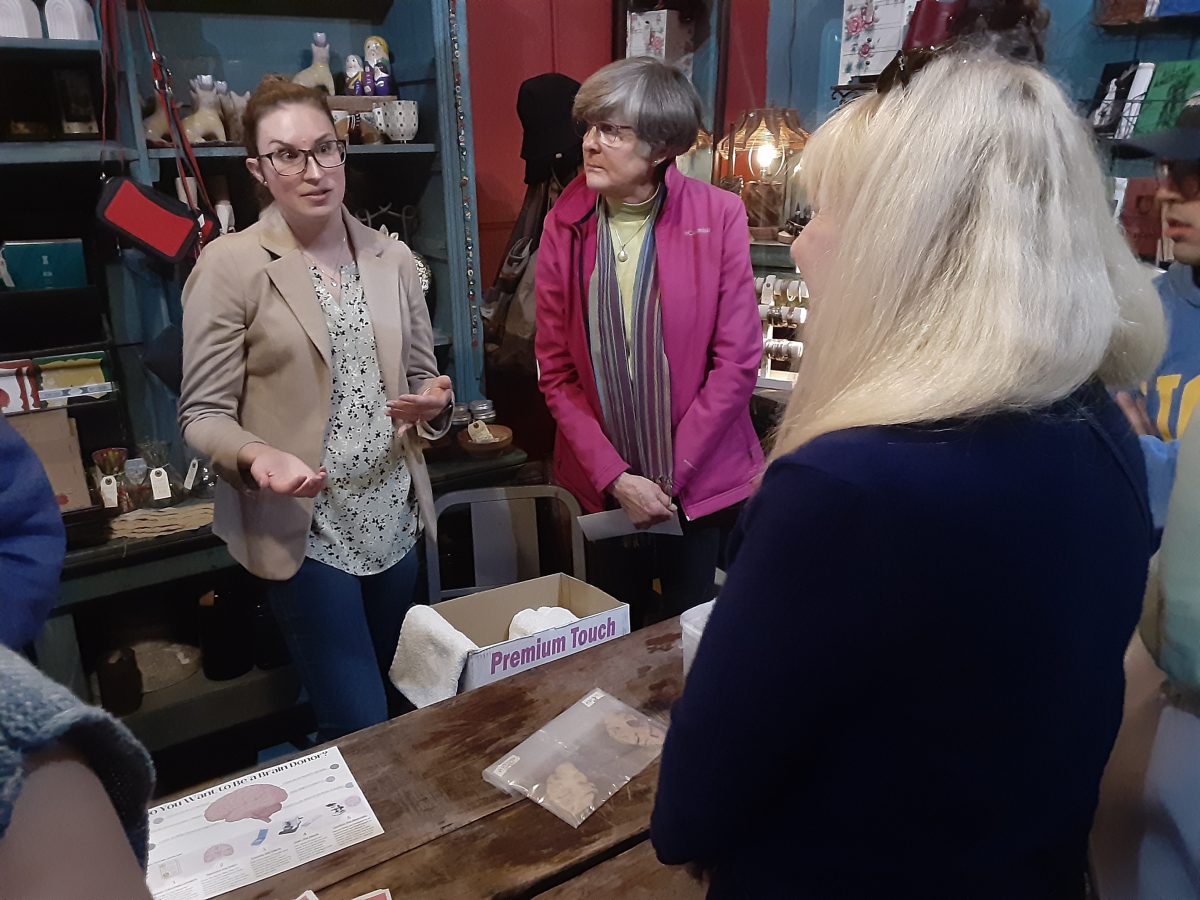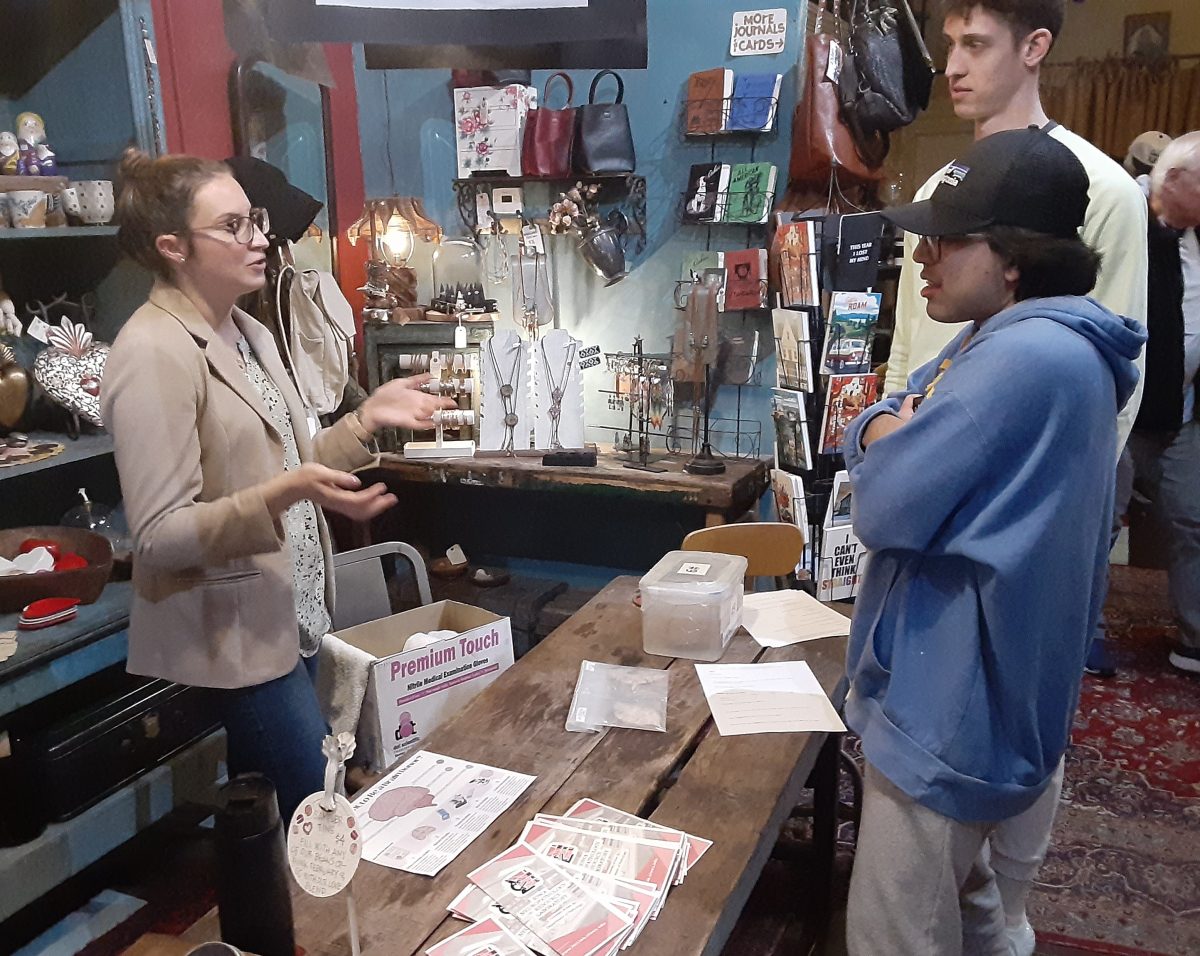Brain donation and organ donation were two topics of the Science Café at Fuel Coffee Shop Thursday, Feb. 22.
Dr. Kimberly Fiock with the University of Iowa’s Iowa Neuropathology Resource Library spoke about the importance of donating brains for the vital research they have to many studies.
In the first part of her speech, Fiock cleared up some of the common misconceptions.
“Anyone can be a brain donor,” Fiock said. “You don’t have to have a diseased brain to do so. In fact, we sometimes need healthy brains to act as a control in our research studies.”
Fiock said that people can sign up before they have passed away, or their loved ones can do that after the fact. If someone wants to donate their brain to science on passing, they need to complete an informed consent decree about what they want to happen to their bodily tissues.
That form can be signed at any time, and it can later be repealed or taken back. Fiock explained that the control of what happens with a brain always remains with the loved ones.
When it comes to getting a brain from a body, Fiock said it doesn’t impact the plans that may have been put in place for aa funeral.
“It’s taken out cleanly, with a incision at the back of the head that will not be noticeable during the funeral,” Fiock said.
Brains donated can be preserved and studied for decades. Fiock said half of the brain is immediately put in a freezer, while the other half is preserved in formaldehyde, which freezes the brain in time and keeps it indefinitely.
The brains at the laboratory are used in several different studies, and there are more than 200 brain banks across the United States that may share the items they have for future studies.
Fiock said that many Alzheimer’s and other brain impacting illnesses are not fully diagnosed until after death, because of the scope of the illness across the brain.
“In Alzheimer’s and related brains, we see these clumps of Tau and other cells that have misfolded across the brain,” Fiock said. “When that happens, it’s like a pile of laundry. One or two pieces in the wrong space and it’s fine, but when they all of a sudden clump into piles in one area, that has a function on neighboring cells.”
That build up happens over time, and depending on the area of the brain that is impacted, that can be responsible for different symptoms loved ones may experience.
Fiock was asked how long after someone passes away a brain may be viable for science.
Fiock said that ideally within 24 hours is when they want to have the brains removed, but that can be made up to 72 hours after the fact.
“The colder it is, the better that is to preserve tissues,” Fiock said.
Fiock’s own research has to do with the helper cells in the brain.
While research is progressing on finding possible cures for Alzheimer’s and diseases, Fiock said that she never wants anyone to be shamed for developing a disease for things that might have been out of their control.
“It breaks my heart when I read cookbooks or health tips about diets or things you can potentially try to stop an illness like Alzheimer’s because there is nothing that proves that those things work,” Fiock said. “What we know now is many of these diseases happen spontaneously to people.”
The other portion of Fiock’s talk was on the importance of donating bodies to science.
Fiock said that while many people check an organ and tissue donor on their driver’s licenses, that focuses primarily on living organs and tissues. If people want their bodies and organs to be used for science after passing, they need to enlist in something like the University of Iowa Health Care’s Deeded Body program to make sure their bodies can be used in that matter.
“Many people think that if they declare they are an organ and tissue donor on their licenses, those will be taken when they pass away, but you need to do both options if you can,” Fiock said.
As for the brains currently at INRL, Fiock said they have more than 300 brains collected over the past few years.
“Our goal is to advance research,” Fiock said.
Brain donation, organ donation topic of Science Café
February 29, 2024
Kimberly Fiock speaks with Nanette Gunn and others about brains after the Science Cafe event at Fuel Cafe and Coffee Shop in uptown Mount Vernon.
Nathan Coutnryman | Staff photo
Kimberly Fiock 2
About the Contributor
Nathan Countryman, Editor
Nathan Countryman is the Editor of the Mount Vernon-Lisbon Sun.


